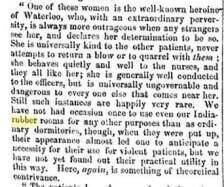
I wrote a novel I called “The Rubber Room” about two high school students who meet on in-school suspension.
My editor disliked the title.“I'd like to suggest that we consider a different title. I have a viscerally negative reaction to the term ‘the rubber room.'" The marketing and sales team said it conjured sex rooms and the mistreatment of the mentally ill. We retitled it "Wilder."

But sex rooms? I started asking people what “rubber room” meant, and found no consensus.
The Oxford English Dictionary yielded nothing. Of the six slang dictionaries I checked, only Green’s offered references:

Beckett, such a literary first citation and, it turns out, a prescient one. But could 1938 really be the earliest usage?
I dug in.
And now, I present a brief family tree of “rubber room,” with four branches, a disco, and three bogus etymologies.
Branch One: The Asylum

“We have not had occasion once to use even our India-rubber rooms for any other purposes than as ordinary dormitories...”
Suffolk Lunatic Asylum, Annual Report of Medical Officer, 1845.
The earliest reference I could find, this report conveys its brutal assumptions about mental illness—and language’s role in those assumptions—in its first sentence: “There are, in the county, perhaps about three hundred and sixty insane paupers, i.e. lunatics and idiots.” But the report also argues against the use of restraints and coercion with this strikingly progressive adage: “You may do almost everything by soothing and kindness, you can rarely do almost anything but mischief by force.” This, coincidentally, could serve as my narrator’s epitaph.
As with other sensationalized and...
Keep reading on Quick and Dirty Tips
Tidak ada komentar:
Posting Komentar